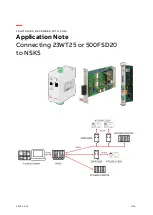
CDM-625 Advanced Satellite Modem
Revision 1
Forward Error Correction Options
MN-0000036 (Ref MN/CDM625.IOM)
of carrier recovery, the demodulator can lock up in any of K phase states where K = 2 for BPSK,
K = 4 for QPSK. Without the ability to resolve these ambiguous states, there would be a 1-in-2
chance that the data at the output of the demodulator would be wrong in the case of BPSK. For
QPSK, the probability would be 3-in-4.
The problem is solved in the case of BPSK by differentially encoding the data prior to
transmission, then performing the inverse decoding process. This is a very simple process, but has
the disadvantage that it doubles the receive BER. For every bit error the demodulator produces,
the differential decoder produces two.
The problem for QPSK is more complex, as there are four possible lock states leading to four
ambiguities. When FEC is employed, the lock state of the FEC decoder can be used to resolve
two of the four ambiguities, and the remaining two can be resolved using serial differential
encoding/decoding. However, when no FEC is being used, an entirely different scheme must be
used. Therefore, in QPSK, a parallel differential encoding/decoding technique is used, but has the
disadvantage that it again doubles the receive BER.
OQPSK is a different situation again, where the ambiguities result not only from not having an
absolute phase reference, but also not knowing which of the two parallel paths in the demod, I or
Q, contains the half-symbol delay. Another type of differential encoding is used, but yet again the
error rate is doubled, compared to ideal.
NOTE:
Whenever uncoded operation is selected, the modem offers the choice between enabling
and disabling the differential encoder/decoder appropriate for the modulation type.
The second problem inherent in PSK demodulators is that of ‘data false locking’. In order to
accomplish the task of carrier recovery, the demodulator must use a non-linear process. A second-
order non-linearity is used for BPSK, and a fourth-order non-linearity is used for QPSK. When
data at a certain symbol rate is used to modulate the carrier, the demodulator can lock at incorrect
frequencies, spaced at intervals of one-quarter of the symbol rate away from the carrier.
Fortunately, when FEC decoding is used, the decoder synchronization state can be used to verify
the correct lock point has been achieved, and to reject the false locks.
However, if uncoded operation is used, there is no way to recognize a data false lock. The
demodulator will indicate that it is correctly locked, but the data out will not be correct.
CAUTION
Comtech EF Data strongly cautions users when using uncoded operation. If the
acquisition sweep width exceeds one quarter of the symbol rate, there is a very
high probability that the demodulator will false lock.
Example: The user selects 64 kbps QPSK, uncoded. The symbol rate will be half
of this rate, or 32 ksymbols/second. One quarter of this equals 8 kHz. Therefore,
the absolute maximum acquisition sweep range which should be considered is
±
8 kHz. If there is any frequency uncertainty on the incoming carrier, this should
be subtracted from the sweep width. The problem becomes progressively better
with increasing symbol rate.
Comtech EF Data cannot be held responsible for incorrect operation if the user does not adhere to
these guidelines when using uncoded operation.
7–10
















































